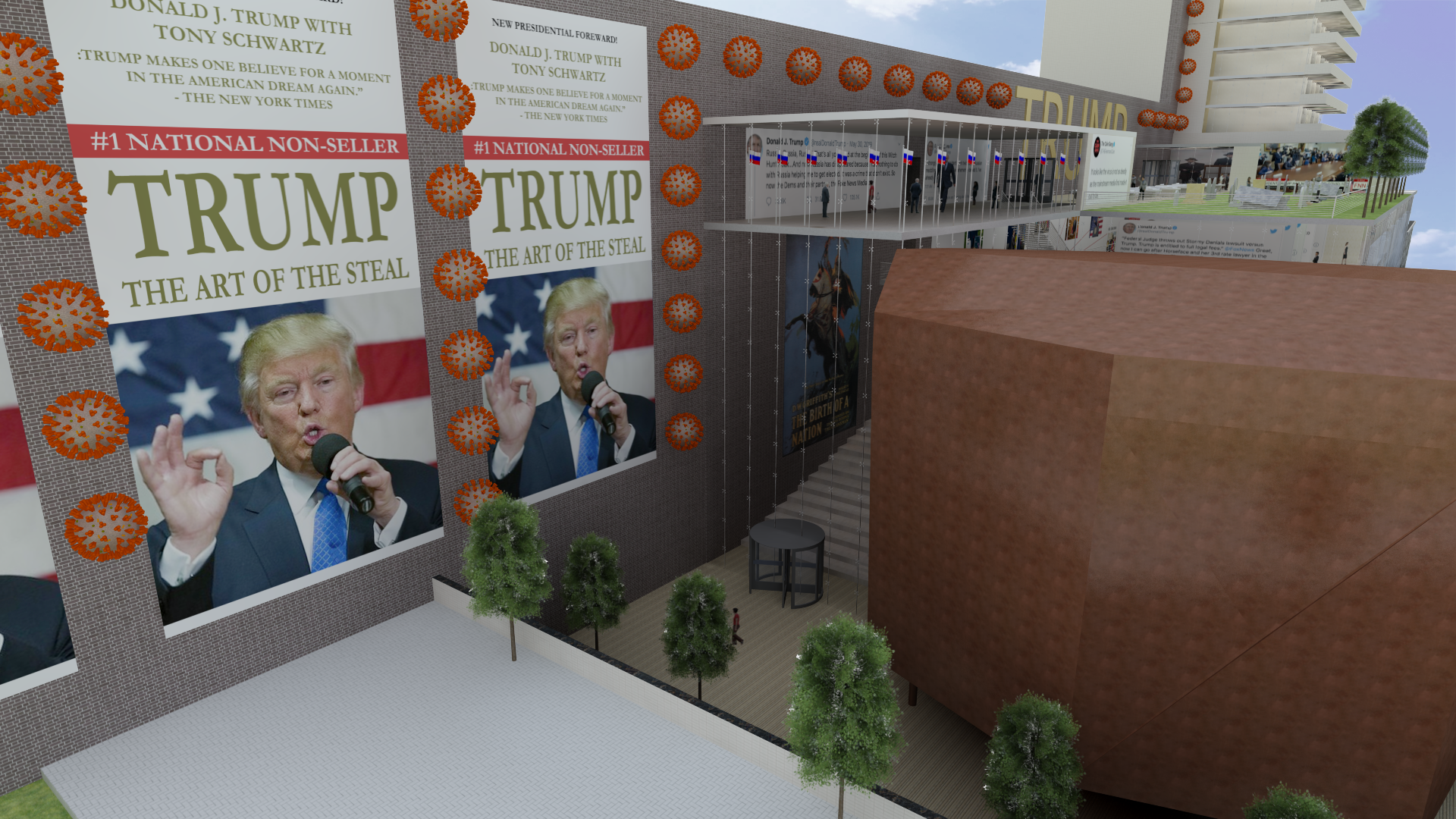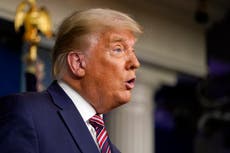‘Tacky’, ‘tawdry’ and a project of self-aggrandisement: Will anyone want Trump’s presidential library?
President unlikely to want to miss out on chance for self-promotion, writes Andrew Buncombe


Your support helps us to tell the story
From reproductive rights to climate change to Big Tech, The Independent is on the ground when the story is developing. Whether it's investigating the financials of Elon Musk's pro-Trump PAC or producing our latest documentary, 'The A Word', which shines a light on the American women fighting for reproductive rights, we know how important it is to parse out the facts from the messaging.
At such a critical moment in US history, we need reporters on the ground. Your donation allows us to keep sending journalists to speak to both sides of the story.
The Independent is trusted by Americans across the entire political spectrum. And unlike many other quality news outlets, we choose not to lock Americans out of our reporting and analysis with paywalls. We believe quality journalism should be available to everyone, paid for by those who can afford it.
Your support makes all the difference.Have you seen Donald Trump’s library? It is really quite something.
The marble-floored foyer is overlooked by a large poster of his famous book The Art of the Steal. Upstairs is a room dedicated to the president’s false and controversial tweets, such as “Mexico will pay for the wall!”
Elsewhere, there is a memorial garden to the hundreds of thousands of Americans who died from Covid-19 on the 45th president’s watch. There is also a “grift shop” that sells pardons, and even a hotel containing rooms that look suspiciously like the one at the Ritz-Carlton in Moscow where Trump was accused – falsely – of hiring two prostitutes to urinate on a bed in the presidential suite once slept in by Barack Obama and his first lady, Michelle.
This library, as you may have guessed, is satire, an online rendering of a fantasy building designed by a New York-based architect who produced it as a means of highlighting many of what they perceived to be the president’s failings.
The architect bought the domain name djtrumplibrary.com a week after Trump was elected. “I've been to presidential libraries – they’re fascinating; they are fascinating concepts,” says the architect, who spoke on condition of remaining anonymous.
“My immediate thought when he won, besides the horror of this guy being terrible, is that they're going to have to have a library. And he will be able to cast his view on what is [in it]. That seemed to be extremely strange.”
The architect tells The Independent his idea was “to have a counterbalance”.
Donald Trump has yet to comment on whether he plans to have a library dedicated to him and the four tumultuous years he spent as the nation’s president. (The White House failed to respond to questions as to his intentions in this regard.)
Yet as he prepares to leave office, with his departure soured considerably by his false allegations that the election was rigged, and his astonishing efforts to overturn Joe Biden’s victory, historians have started to consider the question of whether he will have a library, and what he might put in it.
If he does not have some sort of museum or archive, he will be the first to miss out on the opportunity either to leave something for historians, or to burnish his image for future generations. Or indeed, both.
From George Washington’s Virginia plantation at Mount Vernon, overlooking the Potomac River, and which attracts an average of 1 million guests each year, to the home of James Polk, the nation’s 11th president, in Columbia, Tennessee, which draws fewer than 12,000, the institutions have been part of America’s touristic and historical fabric. Many are the locations of the tombs of the leaders.
Richard Nixon’s presidential library in Yorba Linda, California, has in its grounds a six-tonne Sikorsky VH 3A Sea King helicopter, which he used on more than 180 occasions. The most remembered, surely, was his final flight from the White House on 9 August 1974, when he left from the South Lawn, having resigned amid mounting scandal and the threat of impeachment.
Only 13 of the presidential libraries are run by the National Archives and Records Administration, but all have some sort of cooperation with the archive for the loan and use of presidential documents, which remain the property of the nation, not the president’s estate.
Robert Clark, an archivist and historian who previously served as acting director of the Franklin D Roosevelt Presidential Library and Museum in Hyde Park, New York, says in the same way that many Americans list on their bucket lists a wish to visit each of the 50 states, so many similarly desire to visit every presidential library.
“Americans are obsessed with our presidents. They think about their history in terms of presidencies,” says Clark, director of archives of the Rockefeller Archive Centre in New York.
“Other countries have a longer view of their own history. But we think in presidencies. We think about, ‘Oh, when were you born, oh, I'm a Reagan baby, or that type of thing.’”
He adds: “And these are interesting people, regardless of your politics. These are interesting, celebrated people who have been the drivers of our history, and of world history. So whether you’re Republican or whether you’re a Democrat, you’re interested in these places.”
Lindsay Chervinsky, a historian of early America and author of The Cabinet: George Washington and the Creation of an American Institution, says presidential libraries represent an opportunity “for presidents to shape the history that’s written about their legacies”. She says several presidents, notably Grant and Eisenhower, left office with low reputations and yet they grew in stature as historians learned more about them.
She is certain that Trump will want a library. “It is an opportunity for self-aggrandisement. And he has demonstrated some real narcissistic tendencies,” she says. “So having a museum to himself and his presidency, I imagine would be incredibly attractive to him.”
Two potential problems for Trump, she says, are money and the matter of location. If reports about his financial challenges are true, he may not have the funds to build his own, and may have to rely on national and international donations, the route taken by George W Bush.
Second, Trump’s neighbours at Mar-a-Lago, Florida, have indicated that they do not want to see him build such a facility there, while the president and his home city of New York have mutually turned their backs on each other.
What might Trump put in such a library?
“I wouldn't be surprised if he had a replica of the wall that he built along the border as that's one of his prized, quote-unquote, accomplishments,” she says.
“Probably something about the Muslim ban, probably something about his war on China and trade. Probably some documentation from his visit to North Korea.”
She adds: “I would imagine there would be a lot of pictures of him meeting with his favorite dictators. And probably big blown-up images of their letters or quotes about him and have great he was.”
Anthony Clark is a former congressional staff member who has written about US presidents, the libraries and the legacies they leave.
He also says libraries have a major role in helping create the image that a president may seek to project, as well as containing issues of major historical importance. Much of George W Bush’s library in Dallas is taken up with the so-called war on terror.
Bill Clinton’s library in Little Rock, Arkansas, which opened in 2004 at a time when Hillary Clinton had very clear presidential ambitions, contains a replica of the cabinet room, and quotes such as, “There is nothing wrong with America that cannot be cured by what is right with America.” It is Clinton the wonk, says Clark, so you do not even ask questions about his character, as raised by his impeachment scandal and his illicit relationship with a White House intern.
A question for Trump, he says, will be whether to focus on his entire life, such as Eisenhower did in his library, or to emulate George W Bush, and focus mainly on the presidency.
“If you’re going to say it’s the presidency that matters, then you have to have the golden escalator,” he says, referring to the moment in the summer of 2015 at Trump Tower, when the future president announced his candidacy.
And who would visit such a place?
“For the first 18 months, you've got the widest and diverse group of people, everyone from hardcore fans, to angry people who go there on what I call hate visits,” says Clark, author of The Last Campaign: How Presidents Rewrite History, Run for Posterity and Enshrine Their Legacies.
“I met a lot of people who, before Bill Clinton opened his library, just couldn't wait to go there, seething with rage. They wanted to see if the blue dress would be on display.”
What does the architect of the satirical Donald Trump library believe could be put in a real one?
“His library will service the man,” says the architect. “His will be something very tawdry and very tacky.”
The architect says all presidential libraries serve to benefit the individual, whether you approve of them or not.
“The reality is he will almost certainly only talk about his achievements. Every president who does the job does have some achievements. So he will find them and he will amplify them. So of course it will have a softening effect on his legacy.”
And the escalator?
“He might,” says the architect. “He might have a model of it maybe, or a photo. He’s a cheap man. I doubt he’d spend the money to take it out of Trump Tower.”



Join our commenting forum
Join thought-provoking conversations, follow other Independent readers and see their replies
Comments